

Migrations : crises ou nouvelles normalités ? La procédure de l’article 7 initiée contre la Hongrie, un an après la Pologne - Involved in #Europe ! Le Parlement européen dénonce la menace « systémique » contre les valeurs de l’UE en Hongrie.
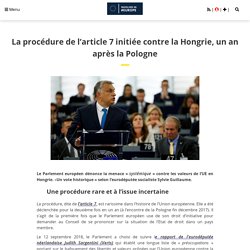
Human rights and Greta on Hungarian state media watch list. (9) Avec le virus, l’occasion de passer à la traque ? L’annonce n’était pas passée inaperçue, et pour cause.
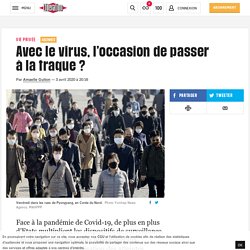
En installant, le 24 mars, le Comité analyse, recherche et expertise (Care), chargé de conseiller les autorités françaises dans leur stratégie de lutte contre le Covid-19, l’Elysée lui a assigné pour mission d’«accompagner la réflexion» non seulement en matière de traitements et de tests, mais aussi sur «l’opportunité de la mise en place d’une stratégie numérique d’identification des personnes ayant été au contact de personnes infectées». De fait, deux anglicismes se sont imposés, à travers le monde, dans le débat public : «contact tracing» et «backtracking», le traçage numérique en français. ‘We Are Like Animals’: Inside Greece’s Secret Site for Migrants. POROS, Greece — The Greek government is detaining migrants incommunicado at a secret extrajudicial location before expelling them to Turkey without due process, one of several hard-line measures taken to seal the borders to Europe that experts say violate international law.

Several migrants said in interviews that they had been captured, stripped of their belongings, beaten and expelled from Greece without being given a chance to claim asylum or speak to a lawyer, in an illegal process known as refoulement. Meanwhile, Turkish officials said that at least three migrants had been shot and killed while trying to enter Greece in the past two weeks. The Greek approach is the starkest example of European efforts to prevent a reprise of the 2015 migration crisis in which more than 850,000 undocumented people passed relatively easily through Greece to other parts of Europe, roiling the Continent’s politics and fueling the rise of the far right. Mr. Mr. Mr. Mr. During the confrontation, Mr. Mr. Human Rights Dimensions of COVID-19 Response. On March 11, 2020, the World Health Organization (WHO) declared that an outbreak of the viral disease COVID-19 – first identified in December 2019 in Wuhan, China – had reached the level of a global pandemic.
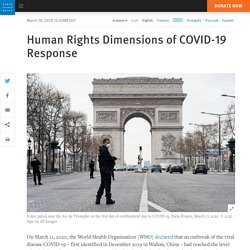
Citing concerns with “the alarming levels of spread and severity,” the WHO called for governments to take urgent and aggressive action to stop the spread of the virus. International human rights law guarantees everyone the right to the highest attainable standard of health and obligates governments to take steps to prevent threats to public health and to provide medical care to those who need it. The scale and severity of the COVID-19 pandemic clearly rises to the level of a public health threat that could justify restrictions on certain rights, such as those that result from the imposition of quarantine or isolation limiting freedom of movement. Contents Applicable International Standards Human Rights Concerns Protect freedom of expression and ensure access to critical information. Witnesses say Australian SAS soldiers killed unarmed Afghan civilians in potential war crimes. Updated 16 Mar 2020, 11:44amMon 16 Mar 2020, 11:44am A Four Corners investigation has uncovered new allegations that unarmed civilians were unlawfully killed by Australian special forces in Afghanistan.

Key points A former special forces soldier says he witnessed some killings by Australian soldiers that he would describe as murderA local imam and his son were killed by Australian soldiers in a raid on the village of SolaA Defence investigation found both men were lawfully killed. In Saudi Arabia, contacting the EU is a crime. On Wednesday (11 March), Loujain al-Hathloul, a female Saudi activist will go to court for a hearing on her trial.

Al-Hathloul was one of the activists who opposed Saudi Arabia's male guardianship and defied the ban for women to drive cars. In March 2018, she was kidnapped in the United Arab Emirates and put in jail in Saudi Arabia, where she was tortured. After a brief release, she and four other women's rights activists were arrested again in May 2018. When Saudi Arabia legalised driving by women in June 2018, al-Hathloul remained under arrest, together with the other female activists. According to her sister, Lina al-Hathloul, who lives in Brussels, Loujain "was held in solitary confinement for no less than eight months, without knowing what she was accused of," adding that "this is absolutely unacceptable. " Now, eight months later, her trial is starting and the accusations are known. One of her 'crimes' appears to be "contacting the embassy of the Netherlands and the EU delegation.
" China: Tibetan Children Denied Mother-Tongue Classes. (London) – China’s “bilingual education” policy has accelerated the demise of Tibetan-medium instruction in primary schools in Tibetan areas, Human Rights Watch said in a report released today.
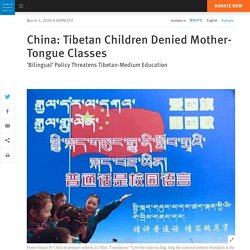
The policy, carried out over the past decade in the Tibet Autonomous Region (TAR) and other Tibetan areas, has increased Chinese language schooling at all levels except for the study of Tibetan language itself. The 91-page report, “China’s ‘Bilingual Education’ Policy in Tibet: Tibetan-Medium Schooling Under Threat,” examines the Chinese government’s rollback of minority education rights in Tibet under the guise of improving access to education.
La question de la nationalité définitivement exclue du recensement américain de 2020. Migrants : sur l’île grecque de Lesbos, « tout le monde est fatigué » World Report 2020: China’s Global Threat to Human Rights. It doesn’t matter where I am, or what passport I hold.

[Chinese authorities] will terrorize me anywhere, and I have no way to fight that. —Uyghur Muslim with European citizenship, Washington, September 2019. NGOs Urge European Parliament to Postpone Consent to EU-Vietnam Trade Deals. Dear Member of the European Parliament, We are writing ahead of the February 11th plenary vote on the EU-Vietnam Free Trade Agreement (EVFTA) and Investment Protection Agreement (IPA) to urge you to vote for postponing Parliament’s consent to the deals until the Vietnamese government agrees to meet concrete and verifiable benchmarks to protect labour rights and human rights.
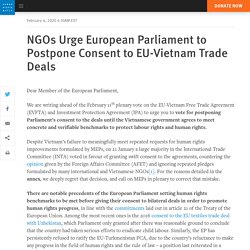
Despite Vietnam’s failure to meaningfully meet repeated requests for human rights improvements formulated by MEPs, on 21 January a large majority in the International Trade Committee (INTA) voted in favour of granting swift consent to the agreements, countering the opinion given by the Foreign Affairs Committee (AFET) and ignoring repeated pledges formulated by many international and Vietnamese NGOs[1]. For the reasons detailed in the annex, we deeply regret that decision, and call on MEPs in plenary to correct that mistake. We hope that you make the right choice. Yours sincerely,